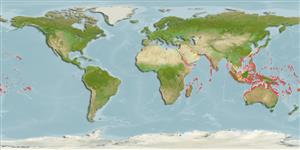Common names from other countries
Teleostei (teleosts) >
Gobiiformes (Gobies) >
Gobiidae (Gobies) > Gobiinae
Etymology: Fusigobius: Latin, fusus = spindle + Latin, gobius = gudgeon (Ref. 45335).
More on author: Günther.
Environment: milieu / climate zone / depth range / distribution range
Ecology
Marine; reef-associated; depth range 0 - 25 m (Ref. 11441). Tropical; 21°C - 30°C (Ref. 27115); 35°N - 33°S, 32°E - 143°W
Indo-Pacific: East Africa to the Tuamoto Islands, north to Ryukyu Islands, south to Lord Howe Island.
Size / Weight / Age
Maturity: Lm ? range ? - ? cm
Max length : 7.5 cm TL male/unsexed; (Ref. 2334)
Dorsal spines (total): 7; Dorsal soft rays (total): 9; Anal spines: 1; Anal soft rays: 8. 1st black spot between 1st 2 dorsal spines; body with small dark spots (Ref. 2798); characterized by semi-translucent grey with small brown spots on head and body; presence of slanting bands along back; fully united pelvic fins; well developed pelvic frenum; rounded caudal fin; longitudinal scale series 22-24; ctenoid scales those on nape; cycloid scales on breast and base of pectoral fin; operculum without scales; median predorsal scales absent, 5-6 scales on side of nape anterior to dorsal fin origin; opening of gill extending nearly to below rear edge of opercle; depth of body 4.0-4.6 in SL (Ref. 90102).
Solitary or in small groups (Ref. 90102). Inhabits tidal reef flats and shallow lagoons, on sand or rubble patches (Ref. 48637). Feeds on organic matter and small benthic invertebrates (Ref. 89972).
Life cycle and mating behavior
Maturities | Reproduction | Spawnings | Egg(s) | Fecundities | Larvae
Benthic spawner.
Randall, J.E., 1995. Coastal fishes of Oman. University of Hawaii Press, Honolulu, Hawaii. 439 p. (Ref. 11441)
IUCN Red List Status (Ref. 130435)
CITES (Ref. 128078)
Not Evaluated
Threat to humans
Harmless
Human uses
Fisheries: commercial; aquarium: commercial
Tools
Special reports
Download XML
Internet sources
Estimates based on models
Preferred temperature (Ref.
115969): 24.7 - 29.3, mean 28.2 (based on 3017 cells).
Phylogenetic diversity index (Ref.
82804): PD
50 = 0.5005 [Uniqueness, from 0.5 = low to 2.0 = high].
Bayesian length-weight: a=0.01023 (0.00477 - 0.02194), b=3.02 (2.84 - 3.20), in cm Total Length, based on LWR estimates for this (Sub)family-body shape (Ref.
93245).
Trophic level (Ref.
69278): 2.9 ±0.25 se; based on food items.
Resilience (Ref.
120179): High, minimum population doubling time less than 15 months (Preliminary K or Fecundity.).
Fishing Vulnerability (Ref.
59153): Low vulnerability (10 of 100).
